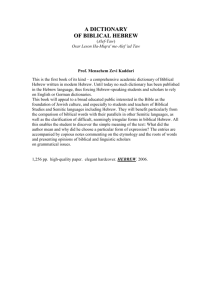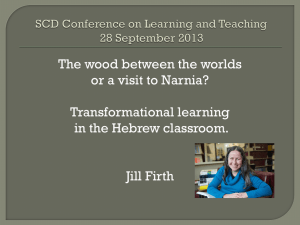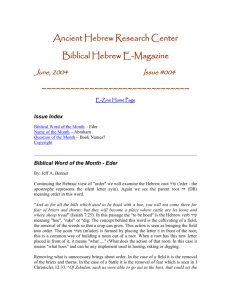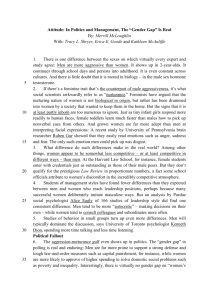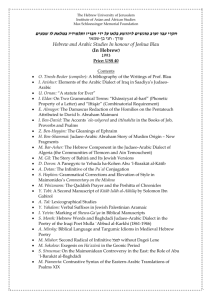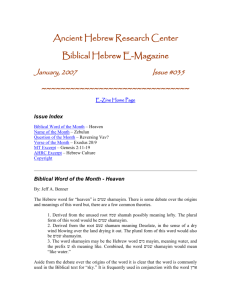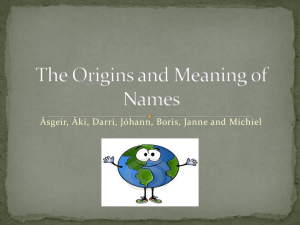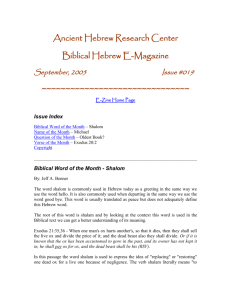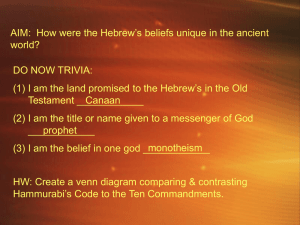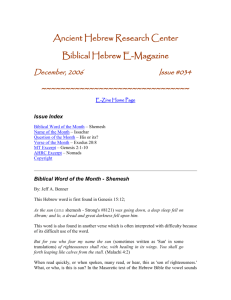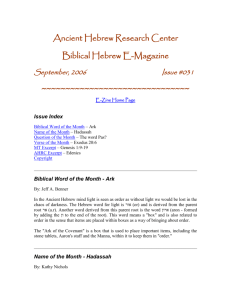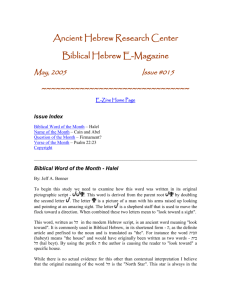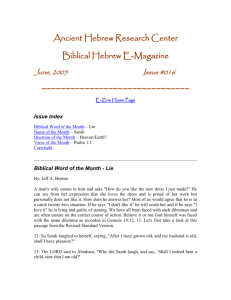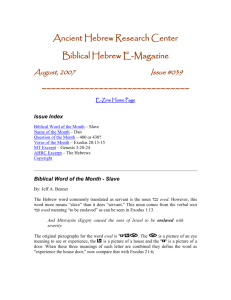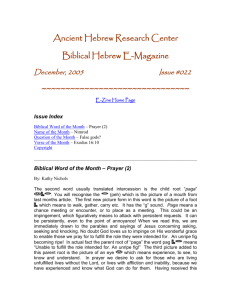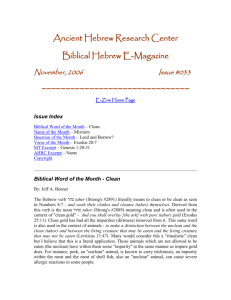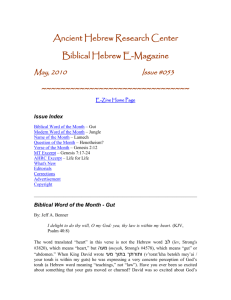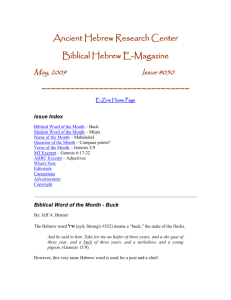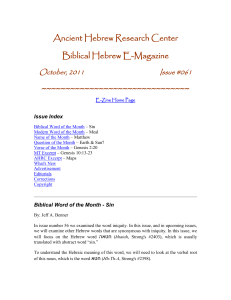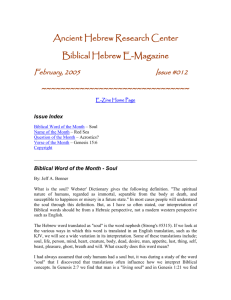Biblical Hebrew E-Magazine - Ancient Hebrew Research Center
advertisement
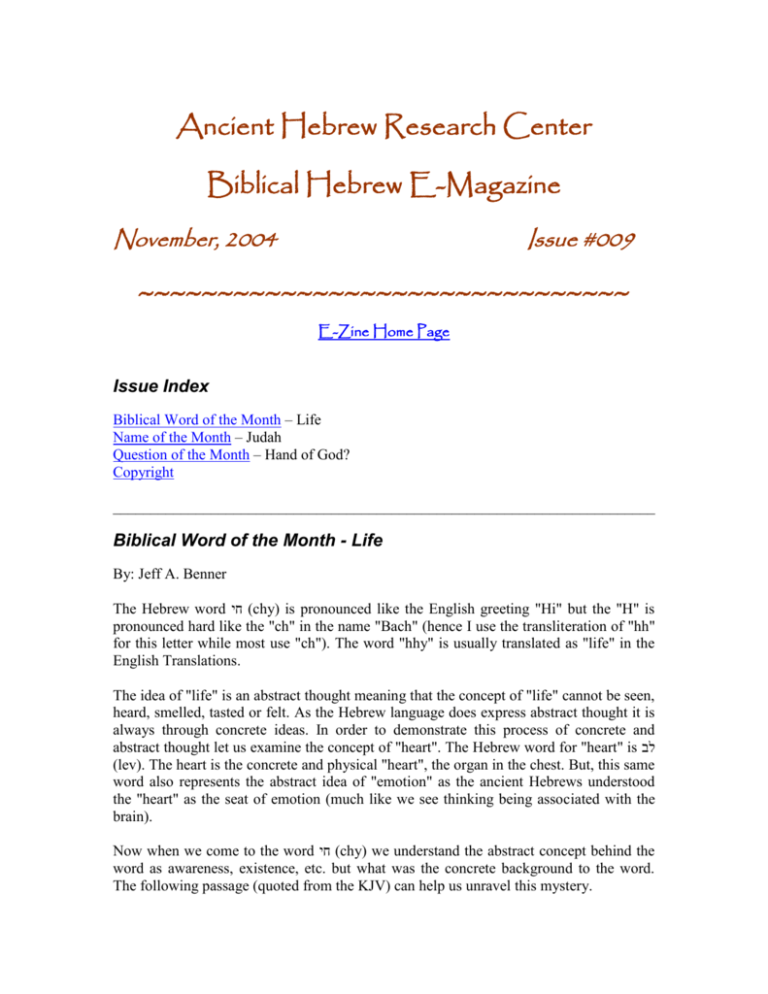
Ancient Hebrew Research Center Biblical Hebrew E-Magazine November, 2004 Issue #009 ~~~~~~~~~~~~~~~~~~~~~~~~~~~~~~~ E-Zine Home Page Issue Index Biblical Word of the Month – Life Name of the Month – Judah Question of the Month – Hand of God? Copyright ________________________________________________________________________ Biblical Word of the Month - Life By: Jeff A. Benner The Hebrew word ( חיchy) is pronounced like the English greeting "Hi" but the "H" is pronounced hard like the "ch" in the name "Bach" (hence I use the transliteration of "hh" for this letter while most use "ch"). The word "hhy" is usually translated as "life" in the English Translations. The idea of "life" is an abstract thought meaning that the concept of "life" cannot be seen, heard, smelled, tasted or felt. As the Hebrew language does express abstract thought it is always through concrete ideas. In order to demonstrate this process of concrete and abstract thought let us examine the concept of "heart". The Hebrew word for "heart" is לב (lev). The heart is the concrete and physical "heart", the organ in the chest. But, this same word also represents the abstract idea of "emotion" as the ancient Hebrews understood the "heart" as the seat of emotion (much like we see thinking being associated with the brain). Now when we come to the word ( חיchy) we understand the abstract concept behind the word as awareness, existence, etc. but what was the concrete background to the word. The following passage (quoted from the KJV) can help us unravel this mystery. Biblical Hebrew E-Magazine "Wilt thou hunt the prey for the lion? or fill the appetite of the young lions" (Job 38:39) The word "appetite" in this verse is the translator’s translation of the word "hhy". An "appetite" is again an abstract word and was probably chosen for the translation as it best fits with the idea of "life". But, if we instead replace appetite with "stomach", a more concrete Hebraic concept, we find that the verse makes much more sense. "Wilt thou hunt the prey for the lion? or fill the stomach of the young lions" Just as the heart is the seat of emotion, the stomach is, according to Hebrew thought, the seat of life. If we think about this we can easily understand why. We must first remember that the Hebrews were nomads who traveled from pasture to pasture with their flocks in search of food and water. This was their primary goal in "life". If food and water were in plenty, life was good, if it was not, life was very bad. ________________________________________________________________________ Name of the Month - Judah By: Jeff A. Benner This name is pronounced "ye-huw-dah" in Hebrew. Most Hebrew dictionaries will define this word as "praise" but as this English word is an abstract word it falls short of its true Hebraic meaning. The parent root of this word is "( "ידYD - yad) meaning "hand". Several child roots are derived from this parent root having the meaning of "throw" including the child root "( "ידהYDH - yadah), the root of "yehudah". The word "Yehudah" has the meaning of "to throw your hands out". If you were standing on the rim of the Grand Canyon for the first time you might throw your hands out and say "Wow, will you look at that". This is the Hebraic understanding of "praise". When Judah was born to Leah (Genesis 29:35) she said "I will "yadah" Yahweh. She was pointing to Yahweh and giving him the credit for the birth of her son. We frequently use the word "praise" in the context of worship to God. Our praise is not meant to be simply singing or praying to God, but acting upon on our belief. Our function is to point to God so that others can see him. This pointing does not have to be a literal pointing but that our actions in all aspects of our life point to God and others will see him as well. _______________________________________________________________________ Question of the Month – Hand of God? By: Jeff A. Benner Q: What does the phrase "Hand of God" mean? 2 Biblical Hebrew E-Magazine A: The Hebrew phrase is "yamin elohiym". The word elohiym means "God" while the word "yamin" is "right hand". The focus of this word is on the idea of "the right hand" in contrast to just "the hand" (yad in Hebrew). The right hand is the stronger hand over the left hand. The "right hand of God" is an idiom for "the strength of God". ________________________________________________________________________ Copyright © 2004 Jeff A. Benner Ancient Hebrew Research Center Please feel free to use, copy or distribute any material within the "Biblical Hebrew E-Magazine" for nonprofit educational purposes only. ________________________________________________________________________ 3

